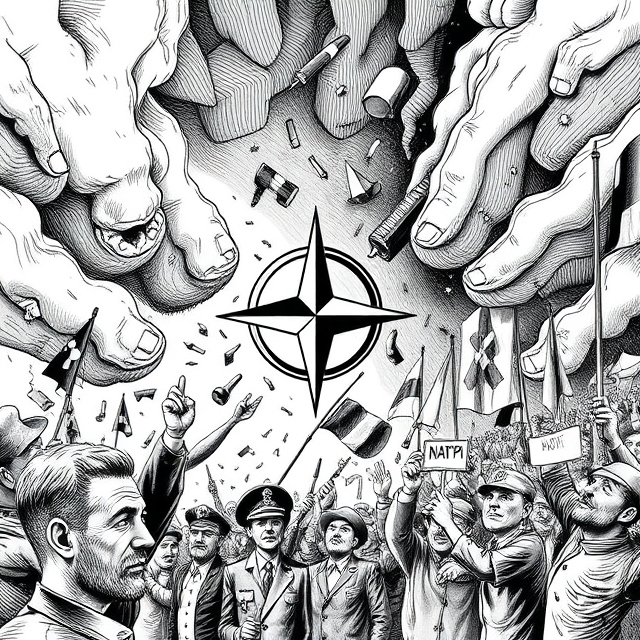
Russia’s Escalatory Moves: Russia’s deployment of advanced weapons like the Oreshnik missiles has escalated tensions in the Russia-Ukraine war, challenging NATO’s readiness to respond effectively.
Trump’s Return and NATO: A potential Trump presidency could impact NATO’s cohesion and support for Ukraine, with concerns over reduced U.S. aid and Trump’s unpredictable stance on the conflict.
NATO’s Strategic Challenges: NATO must prepare for potential U.S. isolationism, requiring greater European responsibility and addressing global threats from Russia’s alliances with China, North Korea, and Iran.
The geopolitical chessboard has become increasingly volatile, with NATO finding itself at a critical juncture amidst escalating tensions between Russia and Ukraine. The prospect of Donald Trump’s return to the White House introduces a complex layer of uncertainty, particularly given his contentious relationship with NATO and his stance on the Russia-Ukraine war. The interplay between Russia’s aggressive posturing, NATO’s collective security commitments, and Trump’s unpredictable approach raises significant questions about the alliance’s future role in global security.
Russia’s Escalatory Moves: A Dire Warning
Russian President Vladimir Putin’s recent remarks regarding deployment of Oreshnik missiles have heightened global anxieties. These advanced intermediate-range ballistic weapons, boasting unprecedented destructive potential and imitating the impact of a nuclear strike, have already been used in strikes against Ukraine’s Dnipro region.
The move came in response to the United States’ decision to allow Ukraine to fire long-range missiles into Russian territory. Additionally, Russia has also threatened to introduce the RS-26 missile variant, a sophisticated weapon capable of carrying multiple warheads over a vast range. The use of such advanced weaponry signals a dangerous shift in the dynamics of the conflict, challenging NATO’s capacity to respond effectively. Thus the alliance faces the urgent task of devising a strategy to counteract the rising threat, with NATO convening emergency summits to address these developments.
Trump Factor: Rethinking NATO’s Role

Donald Trump’s potential return to the presidency in 2025 introduces a pivotal variable in NATO’s strategic calculus. Trump’s admiration for Vladimir Putin and skepticism toward Ukrainian President Volodymyr Zelenskyy complicate the alliance’s efforts to present a united front against Russian aggression. His campaign promise to “end the conflict before taking office,” without providing substantive details, has raised alarm about a potential rollback of US support for Ukraine. This concern is amplified by research from Germany’s Kiel University, which predicts that US aid to Ukraine could fall significantly under a Trump administration, potentially dropping from €59 billion to €34 billion. Such a reduction could undermine NATO’s collective efforts to bolster Ukraine’s defenses.
Road Ahead for NATO
As NATO grapples with these multifaceted challenges, its strategic priorities must adapt to the evolving geopolitical landscape. The alliance’s commitment to Ukraine has been unwavering, with significant military and financial support aimed at bolstering Kyiv’s resistance against Russian advances. However, the uncertainty surrounding US leadership under Trump necessitates a recalibration of NATO’s approach.

To mitigate the risks associated with potential US isolationism, European allies may need to assume a greater share of the burden in supporting Ukraine and deterring Russian aggression. This includes increased investment in defense capabilities, enhanced coordination of weapon supplies, and stronger political cohesion within the alliance. Additionally, NATO must address the broader implications of Russia’s partnership with China, North Korea, and Iran, which collectively pose a formidable challenge to global stability.
The unfolding situation underscores the importance of NATO’s role in maintaining international security. The alliance must navigate these turbulent times with strategic foresight, balancing the need for robust deterrence with diplomatic efforts to prevent further escalation. In this era of heightened uncertainty, NATO stands at a crossroads. Its actions in the coming months will not only shape the trajectory of the Russia-Ukraine conflict but also define the future of transatlantic relations and global security.
Palak Dogra, a journalist and Delhi University graduate is committed to shedding light on critical international and national developments, aiming to engage the public on issues that truly matter.
